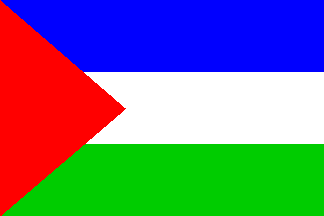
image by Ivan Sache, 23 July 2013

Last modified: 2021-08-25 by rob raeside
Keywords: costa rica | guanacaste | tree |
Links: FOTW homepage |
search |
disclaimer and copyright |
write us |
mirrors

image by Ivan Sache, 23 July 2013
See also:
Political Parties:
Cantons:
Guanacaste Province (280,488 inhabitants; 101,470 ha) is the westernmost
province of Costa Rica. The province was renamed Moracia from 1854 to 1860. The
capital of the province is the town of Liberia, known as Guanacaste until 1854.
Ivan Sache, 23 July 2013
I visited Costa Rica in November 2000. I made only one
observation of a flag I did not know. This was the flag of
Guanacaste province. It is shaped like the Palestinian flag. It
has blue insted of black, but I cannot now remember whether the
top or bottom stripe was blue.
Jan Oskar Engene, 24 January 2001
I receive this flag from three sources so I believe that above
is the correct flag. Guanacaste is a region diferenciate from the
rest of Costa Rica. It was part of Nicaragua during spanish
domain and joined Costa Rica after the independence.
Jaume Ollé, 27 January 2001
Guanacaste flag has the blue stripe upwards and the green one
downwards. So it is blue, white and green with a red triangle on
the stem. Thus it is exactly like the Palestinian flag when you
replace black by blue.
Bernard Monot, French Embassy in San Jose, 28 October
2002
Some details about Guanacaste flag were published in Flag
report 15. The flag takes the colors of Costa Rica (red, blue and
white) and adds the green for the province's Pampas. It was
created by mid seventies in a contest held by the provincial
government. Guanacaste is a territory incorporated to Costa Rica
on 25 July 1824 and until then it belonged to Nicaragua, and
therefore it has a differentiated personality. In a letter of
Lic. Marco Tulio Gardela he describes this flag with three
horizontal stripes: blue, white and green, with the red triangle
at the hoist, but the Mayor of Liberia Mr Hugo Zuñiga sent to
the Argentine vexillologist Lic. Mr. Bacchi a photocopy of a
drawing with the stripes inverted, though it could be just that
it was photocopied upside down.
Gardela indicates that the red triangle stand for the heart of
the Guanacastecans, their fondness and happiness, their courage
and manliness shown in many occasions; blue is for the province's
transparent sky; white is a sapphire mantle in the province's
fertility and peace. green is the provincial emblem for the
Guanacaste tree, the pasture, the crops, the work of the peasant
and the cattleman.
Jaume Ollé, 28 October 2002
The flag was designed by Eddie Alvarado Herrera, a Professor of English born
in Tilarán on 15 October 1936. The flag was inaugurated during the parade held
in July 1974 on the main street of San José to celebrate the 150th anniversary
of the annexation of Nicoya Party to Costa Rica.
Sources:
Cascante's blog, and
photo of the
flag
Ivan Sache, 23 July 2013

image by Jaume Ollé, 28 October 2002

image by Jaume Ollé, 28 October 2002
Some variants are in use. At time of the edition of Flag
Report, a vriant flag in use featured a blue, white, green flag
(5:2:5) with triangle only in the narrow white stripe, similar to
the argentinian provincial flag called "bandera del
pico". Later I checked with several people that enforcment
of legislation about flag is not very rigid in Costa Rica, and
frequently variations are issued (this one must be the work of
some unrespectful manufacturer)
Jaume Ollé, 28 October 2002
g.gif)
erroneous image
image by Jaume Ollé, 28 October 2002
The provincial arms contain the Guanacaste tree, that is the
national tree. The legend of the ribbon says "de la patria
por nuestra voluntad" (of the fatherland by our will) and
refers to the voluntary union of the district to Costa Rica in
1824, after having belonged to the intendency of Nicaragua.
Jaume Ollé, 28 October 2002
The coat of arms of Guanacaste, of unknown designer, was adopted in 1929. The
shield is charged with a guanacaste* tree, the province's namesake. The reddish
background of the shield represents the reflection of the sun on the pampas at
twilight. The blue border of the shield represents the sky. The coffee brown
colour of the shield base represents the fertile soil of Guanacaste. The lower
scroll is charged with the motto "De la Patria por Nuestra Voluntad" [Part of
the Homeland of Our Own Free Will], used by the Nicoya Party** when proclaiming
annexation to Costa Rica. Yellow represents maize cobs and rice panicles.
Source:
Cascante's blog,
*guanacaste, "Enterolobium cyclocarpum" (Jacq.) Griseb., was proclaimed the
national tree of Costa Rica by Decree No. 7 of 31 August 1959.
Source:
http://ocascante.blogspot.fr/2009/02/el-arbol-de-guanacaste.html
**Nicoya Partido, made of the villages of Nicoya, Santa Cruz, Bagaces,
Guanacaste and Canas, proclaimed on 25 July 1825 its annexation to Costa Rica;
this was confirmed in 1826 by the Federal Congress of Central America.
Source:
http://www.guanacastequidad.com/index.php?option=com_content&view=article&id=13:simbolos-regionales-de-la-provincia-de-guanacaste&catid=15:herencias&Itemid=109
(image)